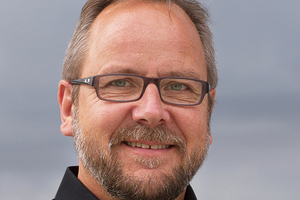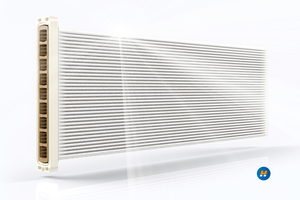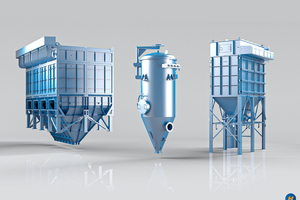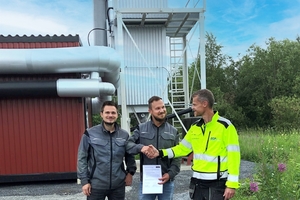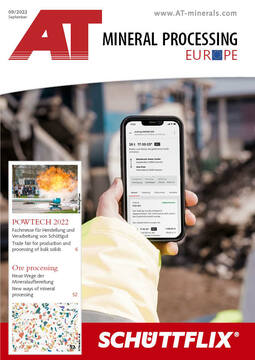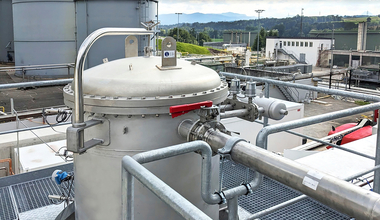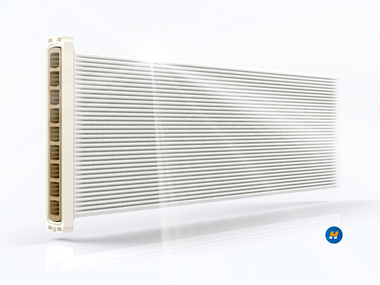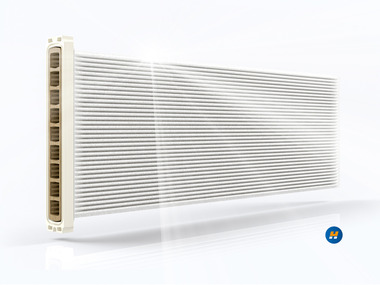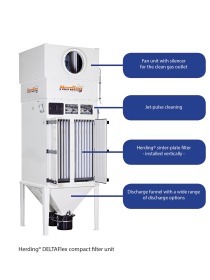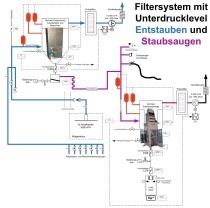Elimination of extraneous particulate emissions
High-efficiency filtration technologies are indispensable in innumerable sectors of industrial production. Both as process filters, where filter systems form an integral part of production facilities, and for the elimination of extraneous particulate emissions in order to protect humans, the environment and machines. Critical awareness of the health-impairing, toxic and generally harmful emissions of particulates (“dust”) has grown continuously in recent times.
The focus here is increasingly on sustainable technology that assures excellent filtration performance combined with long service-lives, high availability and a low susceptibility to failure. Thanks to their constant operating conditions, durability, high availability and continuous filtration efficiency, sintered filter media supplied by Herding®Filtertechnik have become firmly established in a most diverse range of applications. Operating temperatures have long been a hindrance, due to the polymer materials used, which prevent the transfer of the unique properties of surface filtration using rigid filter media to the higher-temperature ranges. Newly developed Herding BETA sets new standards and demonstrates excellent filtration properties at temperatures of up to 160° C.
Pure surface filtration – nothing else
The pure surface filtration characteristics of Herding Sinter-Plate Filters have formed the basis of tried-and-proven technology for many decades. This property, and thus the absence of any tendency to embedding of fine particles in the filter medium, is achieved by means of a homogeneously incorporated coating acting as a filter-active layer present in the surface of the rigid filter medium. The combination of a sintered structure and an embedded coating tailored to the particular application is what makes the Sinter-Plate Filter so durable and so effective. Guaranteed clean-gas values close to the detection limit speak for themselves – and are achieved even with ultra-fine particulates.
Filtration-induced wear is reduced to a minimum, since the highly durable filter medium is not subjected, like conventional flexible media, to unceasing bending. The rigid matrix, in combination with the filtration-active layer, remains present throughout the entire life-cycle and, as experience demonstrates, undamaged, even in use with abrasive particulates and products.
This is the result of yet another unrivalled property of a rigid medium combined with a surface coating. The relevant literature states ATEX Zone 22 for the clean-gas chamber of the filtering separators in conventional filter systems, which harbour the danger of breakdowns caused by dust breakthroughs. Such problems cannot occur in the geometrically stable Herding® Sinter-Plate Filter type. The filter medium acts as an ATEX Dust-Ex-Zone-Barrier. There is thus no explosible particulate atmosphere, and therefore no ATEX dust zone present in the clean-gas chamber. This unique fact is also described in Sheet 6 and Sheet 6.1 of the VDI 2263 standard, thus confirming the permanent passive and active safety of this technology.
Development totally orientated around market benefits
Herding’s objective in the development of new filter media is, in every case, the expansion of the tried-and-proven performance of the classical Sinter-Plate Filter to new applications and entry to new industries, sectors and markets.
Since the classical Herding® Sinter-Plate Filter featuring basic matrix materials on a polyethylene basis are, by definition, usable only up to 70° C operating temperature and, in the thermostabilized variant, up to 100° C, there was a gap in the product portfolio for applications above these temperatures. It was, therefore, an obvious step to pursue a development which could combine the unparalleled properties of Sinter-Plate Filters with the capability for operating temperatures of above 100° C.
Here, detailed Research & Development work initially focused on the search for suitable materials which would, as a first criterion, meet production-technology needs. In addition, resistance to chemical and thermal attack, homogenous sinterability and high levels of mechanical strength and toughness were also part of the requirement profile.
After the creation of the “material basis”, the emphasis of development then concentrated, naturally enough, on the essential filtration properties of Herding® rigid filter media, such as constant pressure drops, high removal rates and all the other important features. The trial phase started with particulates tests at laboratory scale and culminated in pilot plants in the most diverse sectors and areas. Use in dryers in the chemicals industry, in the production of additives in the food industry, and of building materials and batteries, are good examples. Various furnace extraction systems, high-temperature filtration downstream crusher installations and, not least of all, applications in the biomass combustion, also generated successful and transferable, practically orientated results, however.
Meeting the demands of the market
Since mid-2021, Herding® has been launched its new Herding® BETA filter medium on the market. This newly developed – and patented – filter medium based on a PPS sintered matrix now provides the benefits of all the familiar features of the classical Sinter-Plate Filter up to a continuous operating temperature of 160° C. Herding® BETA is a new filtration technology which is extremely versatile in use and assures extreme resistance to chemical attack and hydrolysis, providing pH resistance in the 1 – 10 range.
Using Herding® BETA, absolutely constant operating conditions, as a result of the pure surface filtration described above, are possible even for operating temperatures of up to 160° C. The Herding® BETA permits particulates concentrations in the clean gas of < 0.5 mg/m³ even when processing extremely fine particulates, thus ensuring effective protection for downstream equipment (such as heat exchangers, for example).
In addition, the new filter medium can also be operated with a reduced compressed cleaning gas pressure upstream the filter; this assures significantly lower operating costs and higher efficiency. The filter medium, like the classical Sinter-Plate filter itself, is totally fibre-free and thus ideal for product recovery without any contamination.
The right plant technology
Continuous service temperatures of up to 160° C in filtration processes demand not only an excellent filter medium, but also plant technology that dependably and sustainably matches the particular processes and allows, in addition, market-orientated pricing.
A large percentage of potential applications in any case operates above a volumetric flow of 50 000 m³/h. The Herding® MAXX series is, correspondingly, used primarily for applications together with the Herding® BETA. The modular structure of the tried-and-proven series of filters permits flexible adaptation to the majority of project needs.
If, for example, optimised cleanability of the filter housing is required, or defined surface qualities, the Herding® PROCESS series is also available for use at up to 160° C. Numerous references in the chemicals industry document the robust, efficient and durable use of this plant concept.
Where round filter housings are necessary as a result of process requirements, Herding® RESIST is the best choice for use with the new Herding® BETA high-temperature medium. The reasons for using a cylindrical design are many and diverse and extend from hygienic requirements in the food industry, via constructive explosion safety via high or extraordinarily low operating pressures, up to the need for defined gas tightness.
Development phase followed by roll-out
Demands for a filter medium for the temperature range up to 160° C which would eliminate the disadvantages of conventional filter media, such as flexible filter hoses, and would on a long-term basis satisfy the needs and the given criteria of processes operated in this temperature range, have been frequently repeated in the past.
Even simply the guaranteed clean-gas concentrations of < 0.5 mg/m³, the expected Herding® BETA service-lives and the constant operating conditions the system enables represent a major advance in process filtration, industrial health and safety, and process reliability.
Herding at Powtech: Hall 3; Stand 3-349
Features of the Herding® Sinter-Plate Filter – Herding BETA model
Pure surface filtration
Resistant to continuous temperatures of up to 160° C
High resistance to hydrolysis and chemicals
Constant operating conditions and volumetric flows
Zero-contamination product recovery
Low maintenance costs thanks to rigid filter medium
Wear-resistant filter element with service-lives of > 15 years even when filtering abrasive particulates
Low space requirements thanks to compact, customised system designs
Energy-efficiency thanks to low filter-inlet compressed gas pressure
Ultra-high availability, rapid amortisation
Extremely low clean-gas values of < 0.5 mg/m³ guaranteed
Author:
Jörg-Armin Schulz, CSO/CMO, Herding GmbH, Amberg/Germany
The graduate engineer in process engineering joined Herding in 1999 and joined the company as branch manager. Before that, he could already look back on several successful years of experience in industrial filter technology. Since 2011, he has been in charge of overall sales and marketing at Herding GmbH Filtertechnik and is a member of the extended management team.

